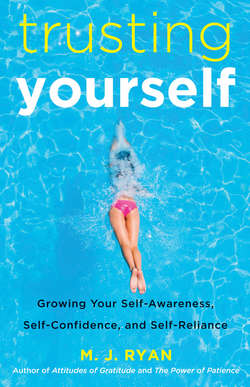Читать книгу Trusting Yourself - M. J. Ryan - Страница 13
На сайте Литреса книга снята с продажи.
Choices Are Easier
ОглавлениеOne's philosophy is not best expressed in words. It is expressed in the choices one makes. And the choices we make are ultimately our responsibility.
—Eleanor Roosevelt
Recently I was sitting at the end of the day in a hotel hot tub with a couple. Up came their daughter to check in—she was seven, maybe eight. I couldn't help noticing she was wearing a very provocative string bikini. When she went off to the pool, the wife asked her husband, “What do you think about that bathing suit?” He mumbled something. Silence for a few minutes. Then she asked again, explaining that her daughter had picked it out herself. Again he said something noncommittal. Five minutes later, she returned to it again: “But as a father, how do you feel about your daughter wearing that suit? I mean, this is the time we need to set standards.”
I left at that point, afraid if I didn't, I would blurt out something it was not my place to say. Talk about not trusting yourself! The woman obviously knew in her heart of hearts that the bathing suit was inappropriate but had given in to her daughter. Now she was practically begging her husband to veto her choice. It was clear that if he didn't put his foot down, she would continue to ignore her own sense of what was right.
Life is crammed full of choices. Indeed, one could say that our lives are comprised of the choices we make on a daily basis. And we must make them in the midst of all kinds of pressures—pressures from kids who want certain things, money pressures, time pressures. Then there's the pressure to sort through all the data to make the right choice among all the options out there.
A recent study revealed that twenty thousand new products are released every year and that having too many choices is making us unhappy. As author Robert Kanigel puts it, “While choices multiply, we stay pretty much the same. Our bodies and minds remain the bottleneck through which choice must pass. We still have the brains our forebears did, still only twenty-four hours a day to use them. We still need time and energy to listen, look, absorb, distinguish, and decide. . . . Each choice saps energy, takes time, makes a big deal out of what isn't.”
I was struck by the reality of this conundrum the other day. I just happened to notice the covers of two magazines: Bride and Modern Bride. Bride was trumpeting 704 pages of wedding dresses; Modern Bride, 512. If you bought both, you could look at 1,216 pages of dresses. Just thinking about that nauseates me.
When we trust ourselves, we don't need to look at 1,216 pages of dresses, unless, as with my friend Chloe, it gives us pleasure to do so. We don't need to agonize over decisions or second-guess ourselves endlessly or look to others, like the mom in the pool, for validation or limit setting. We know that we can live through the consequences of our choices without beating ourselves up because we believe, as psychologist John Enright says, that “you always chose right, given the resources you had.” Even if that mother had, in a moment of weakness, given in to her daughter, with self-trust she could decide to reverse her decision once she realized she had made a mistake.
Choice is about the capacity to make our wishes known, to ourselves or others, act on that knowledge, and then deal with the consequences and revise if necessary. Trusting ourselves allows us to do that more swiftly, comfortably, and with less regret. Given the number of choices we must make in a day, that's no small gift!
